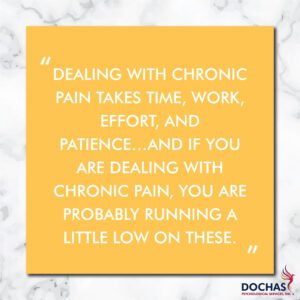Hello—it’s Rachael here on the Dóchas blog, and today I’m going to share mental health tips for dealing with chronic pain. Living and dealing with my chronic pain has resulted in the general rule that those close to me all know: “if I am not complaining about pain, I am in pain, if I am complaining about pain, I am in a lot of freaking pain.” Living and dealing with chronic pain is exhausting!
Chronic pain persistently ebbs and flows for no apparent reason, and often it’s invisible—meaning those around you don’t even know you are dealing with chronic pain unless you tell them. Many times it pushes you to your breaking point. With all of this, it’s no surprise that chronic physical pain is linked to emotional pain. So how do you live and deal with something so fickle?
Dealing with chronic pain takes time, work, effort, and patience…and if you are dealing with chronic pain, you are probably running a little low on a few of these. Hopefully these tips will help recharge you and give you some fresh ideas on how to maintain your mental health while dealing with chronic pain.
1. Reduce and manage stress.
Stress can increase your symptoms of pain and is also a nightmare for our mental and physical health. Learning to manage your stress is essential in maintaining your mental health when coping with chronic pain. Check out these blogs for more information on stress:
- How to recognize when you’re stressed
- Ease stress symptoms with this mindfulness-based stress reduction strategy
2. Practice self-compassion.
We are so understanding towards the difficulties of others but struggle to extend this understanding to ourselves. Allow yourself some grace! You know the warm comforting feeling of acceptance you experience when you are visiting us at Dóchas. Well, learning to have this self-compassion towards yourself and your pain can do wonders for your mental health. Rather than loading up on self-criticism, learn self-compassion through practicing to be warm, understanding, and non-judgmental towards yourself. Mindfulness techniques are great at helping develop this skill.
3. Use positive self-talk.
When you focus on the bad things, it is easy to feel weighed down, so it makes sense that focusing on the good can help lift you up. Positive-self talk doesn’t mean dismissing or ignoring that you are in pain but rather accepting it (self-compassion) and focusing on the good things you are doing to help deal with the pain. It is saying “Yes I am uncomfortable, but I am working on improving my quality of life by reading this blog”.
4. Let yourself take a break.
Somedays all you want to do is curl up in a ball and hide, and I get it! So, guess what? You can! This is me giving you permission to take a break when you need it. When someone has the flu and takes a couple of days off, do we get mad and judge them? No, so why are you judging yourself for needing a break when dealing with chronic pain? Practice that self-compassion and take a guilt-free break.
5. Identify and build your support group.
Individualism is very prevalent in western society, but when it comes to maintaining mental health while dealing with chronic pain (or any mental health issue), going it alone is not always the best option. Write a list out or make a list in your head of all the people you can call on for any support you may need. Some great people to include on the list are:
- People who can help with errands
- Support groups
- Emotional support
- People for fun social interaction
- Professionals (mental health professionals, medical doctors, paramedical professionals)
Learning to accept and ask for help can be difficult but practicing self-compassion makes this easier. Having and using your support group is also beneficial in decreasing social isolation, which if the pandemic taught us anything, is a nightmare for our mental health.
6. Put effort into sleep, eating habits, and hobbies
It is easy to let your sleep, eating habits, and hobbies slide when dealing with the exhaustion of being in chronic pain. However these are some of the most important components that affect your mental health, and it is important to put effort into maintaining these. This doesn’t mean every meal needs to be a 3-course gourmet menu, but it does mean taking the time to make sure you eat (even if it’s ordering food, making a can of soup, or calling on a friend when you are too worn down to cook yourself). The same goes for sleep: while getting eight hours every night doesn’t always happen, putting effort into maintaining a regular sleep schedule does wonder for your mental health. Life without any hobbies or fun gets old fast, but putting effort into these fun activities makes the hard stuff easier to deal with.
This list probably seems ridiculously long and difficult, especially because you are already worn out from coping with your chronic pain. I recommend not trying to tackle this list all at once! Pick the tip that seems most manageable to you and practice implementing that change into your life first, and once you are comfortable with that tip try and work on another one. Or book an appointment with us and we can help you learn and implement different techniques for maintaining your mental health when coping with chronic pain!
To reach out to us here at Dóchas Psychological Services, email us at info@dochaspsych.com, or phone 780 446 0300. One of our professional therapists will be happy to assist you in navigating chronic pain or other challenges with mental health.
About Dóchas Psychological
Dóchas Psychological Services is a well-established and trusted therapy clinic located in Spruce Grove, Alberta. At Dóchas we value the idea that everyone deserves a safe space. Through connection and education, our team works hard to build a trustworthy relationship with each of our clients. It is our goal to create a community for our clients to feel like they belong.
Disclaimer
Information provided through Dóchas Psychological Services blogs or vlogs is meant for educational purposes only. They are NOT medical or mental health advice. You can read more about our disclaimer here.











